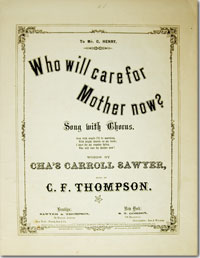
Who Will Care for Mother Now? (1863), a song with words by Charles Carroll Sawyer and music by C.F. Thompson, is an
example of the popularized genre of sentimental music, stories, and poems written during the mid-Civil War period. This body of
works documented the experience of individual soldiers on the battlefield and often attempted to embody their thoughts moments
before death. The ever-increasing number of Civil War casualties, compounded by the unbearable grief and sacrifice faced on the
home front, both North and South, created a shift in focus from the patriotic and grand works written earlier in the period to a
new sentimental individualistic style later known as "feminized" war literature.
During the Civil War, mothers were considered to have great influence over their son's decision to enlist in the armed services
and consequently they were often immortalized in verse along with their sons. The War's concept of masculinity allowed for a show
of "appropriate" emotions, especially in the longing for home and hearth and in expressing love and concern for one's mother.
In Who Will Care for Mother Now, Sawyer personified the dying soldier, at once hero and devoted son in the words of the
chorus: "Soon with angels I'll be marching with bright laurels on my brow; I have fallen for my country, who will care for mother
now?"
Charles Carroll Sawyer was a major contributor to the body of sentimental works written during the Civil War period with
additional songs such as I Dreamed My Boy Was Home Again and Mother Would Comfort Me Now. The popularizing of the genre
did much for the field of music publishing and by 1864 the song Who Will Care for Mother Now, self-published by Sawyer and
Thompson, had sold over one half million copies.
Bibliography
H. Dichter and E. Shapiro, Handbook of Early American Sheet Music, New York, p. 118, 1977; A. Fahs, The
feminized civil war: Gender, northern popular literature, and the memory of the war, 1861-1900, The Journal of American
History, v.85, pp. 1461-1495, 1999; A. Fahs, The Sentimental Soldier in Popular Civil War Literature, 1861-65, Civil War
History, v.46, p. 107-134, 2000; The Lester S. Levy Collection of Sheet Music, available at John Hopkins University
http://levysheetmusic.mse.jhu.edu [accessed 11 May 2005]; L. Smith, Antebellum and Civil War America, 1784-1865: Patriotic
Music, available at http://www.uncp.edu/home/canada/work/allam/1784-1865/music/music2.htm
[accessed 10 May 2005].
|

